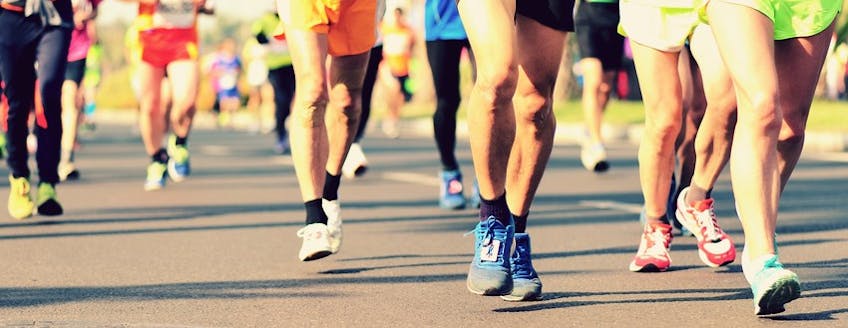Get The Right Nutrition
With marathon season just around the corner, hundreds of thousands of runners across the UK are completing their last few long runs in preparation for the big day. As experts in sports nutrition, Maximuscle understand the importance of spot on nutrition to help you across the finish line.
Eating well for training is just as important as perfecting your nutrition for the marathon itself. Give your body everything it needs to get through the long runs, keep you strong and maintain your health. Perfect your nutrition during training with Maximuscle’s ‘Nutrition for Marathon Training’ guide to ensure your body is geared up for marathon day.
HEALTHY BALANCED DIET
Following a healthy balanced diet is vital to supporting an active lifestyle and to stay healthy, this is particularly important if you’re pushing your body by running a marathon. Make sure to get at least 5 portions of fruit and veg per day, 2 portions of oily fish per week and reduce your intake of foods that are high in fat, salt and sugar.
It’s important to note that nutrition for marathon training will vary depending on the mileage you intend to cover that day. Eat for the day ahead and make sure you’re giving your body the resources it needs to perform.
DAILY RECOMMENDATIONS
The amount of energy and carbohydrates you need during training will depend on how long your run is that day, the more miles you put in the more energy you will require. Carbs provide 4 calories per gram, and so for the longer runs you’ll need to up your carb intake.
Marathon training takes a toll on your body, and so meeting your daily protein requirements needs to be a focus at each meal. Unlike carbohydrate requirements daily protein doesn’t vary drastically depending on training days.
Daily carb and protein requirements are worked out based on your body weight. Simply multiply your body weight by the recommendations shown below. For example, a 70 kg individual training 2 hours per day will need between 420 – 700 g carbs and between 70 – 98 g protein per day.
| Daily Carbohydrate1 | Daily Protein2 | |
|---|---|---|
Hours running per day |
Carbohydrate recommendations (g/kg body weight/day) |
1 – 1.4 g/kg |
1 – 3 |
6 – 10 |
|
>4 - 5 |
8 - 12 |
|
DURING TRAINING RUNS
What you eat and drink during the marathon is one of the biggest concerns for first time runners in particular, and a good nutrition strategy can be the difference between an enjoyable experience and living hell. Remember, what works for one person might not work for the next and mid race is not the time to find out you’re reacting badly to a certain snack choice! Try out different carb snacks and fluid volumes during training runs to see what is best for you on the day.
Take a look at the Maximuscle ‘Mid Marathon Nutrition’ article to find out more.
POST TRAINING RUN
After a long training run you’ll either be in two camps; ‘I can’t eat a thing’ or ‘I’m ravenous’. Either way try to have a snack or meal that’s rich in carbs and provides about 20 – 25 g high quality protein 3, to replenish your stores and to prepare your body for subsequent training runs. If you find food difficult to stomach after training, why not try something liquid based such as a fruity smoothie.
The following snacks contain both carbs and protein:
- Yoghurt & granola bowl
- Fruit smoothie
- Peanut butter bagel
- Chocolate and banana milk
- Eggs on toast
- Grilled chicken and pasta
- Salmon and quinoa
HYDRATION
Being optimally hydrated is incredibly important for health, and becomes even more important during exercise, particularly high-intensity exercise such as long distance running. When exercising the body’s core temperature will rise due to the heat generated by working muscles. Sweating helps our bodies to lose this heat and keep core temperature at a constant level. We also lose a certain amount of fluid from expired air.
Dehydration can strain the cardiovascular system and increase body temperature which can in turn increase the risk of heat illness. Scientific research has also shown that endurance performance like marathon running can be reduced if the body is dehydrated by as little as 2% loss in body weight4.
Everyone sweats at different rates so it’s important to become familiar with your individual sweat rate during training to help manage fluid needs. Check out the Maximuscle ‘Hydration in Sport and Fitness’ article to find out your sweat rates and to for more advice about hydration for marathon training.
QUALITY SLEEP
Training runs and eating well are key priorities for any runner planning to complete a marathon, but getting enough quality sleep should also be considered. Sleep is essential for your body to adapt and recover between training sessions. Try to get at least 8 hours of sleep per night and supplement with naps if necessary.
CONCLUSION
By eating a healthy balanced diet with the right amount of carbs and protein specifically tailored to you can help support marathon training. Good luck from the Maximuscle team!
References
Burke L., Hawley J., Wong S., & Jeukendrup A. (2011). Carbohydrates for training and competition. Journal of Sports Sciences, 29 Suppl 1, S17-27.
American College of Sports Medicine, American Dietetic Association, Dietitians of Canada. (2009). Nutrition and athletic performance. Medicine and Science in Sports and Exercise, 41, 709-731.
Phillips, S. & Van Loon, L. (2011). Dietary protein for athletes: from requirements to optimum adaptation. Journal of Sports Sciences, 29 Suppl 1, S29-38.
Shirreffs, S. & Sawka M. (2011). Fluid and electrolyte needs for training, competition, and recovery. Journal of Sports Sciences, 29 Suppl 1, S39-46.












